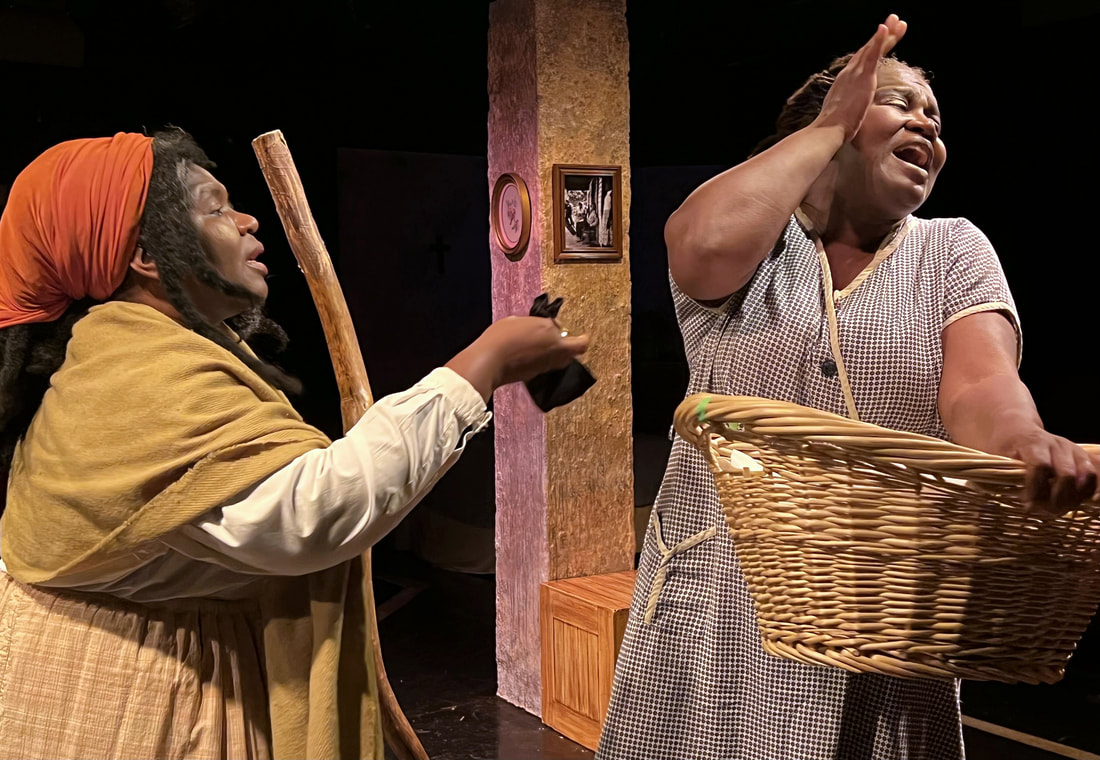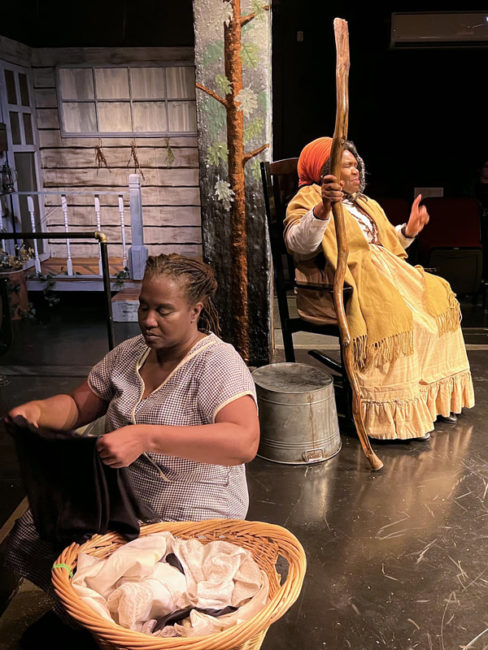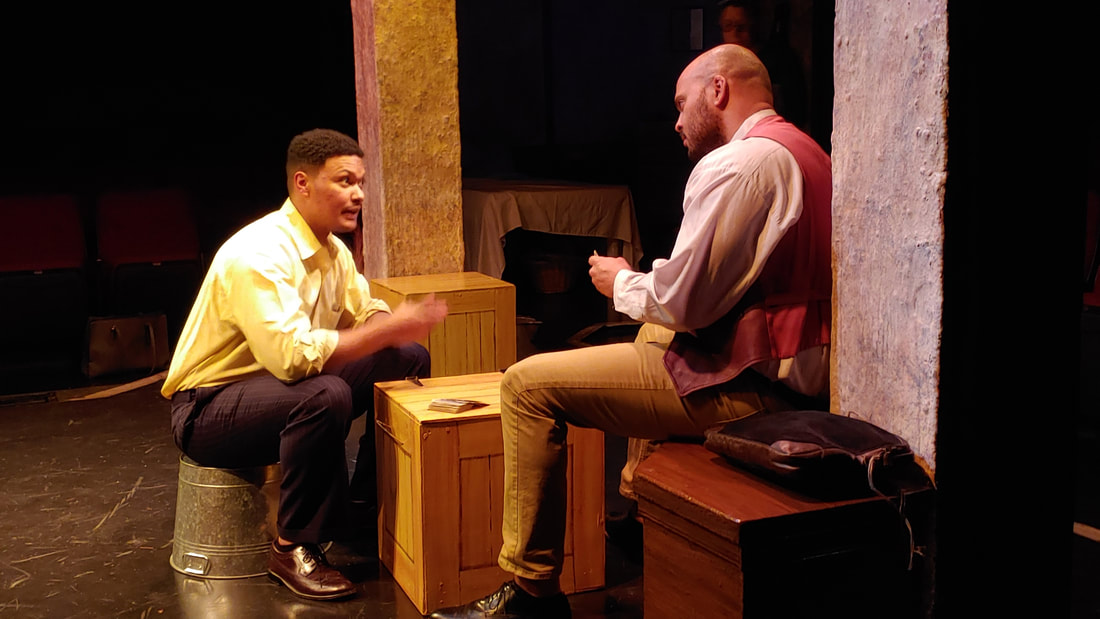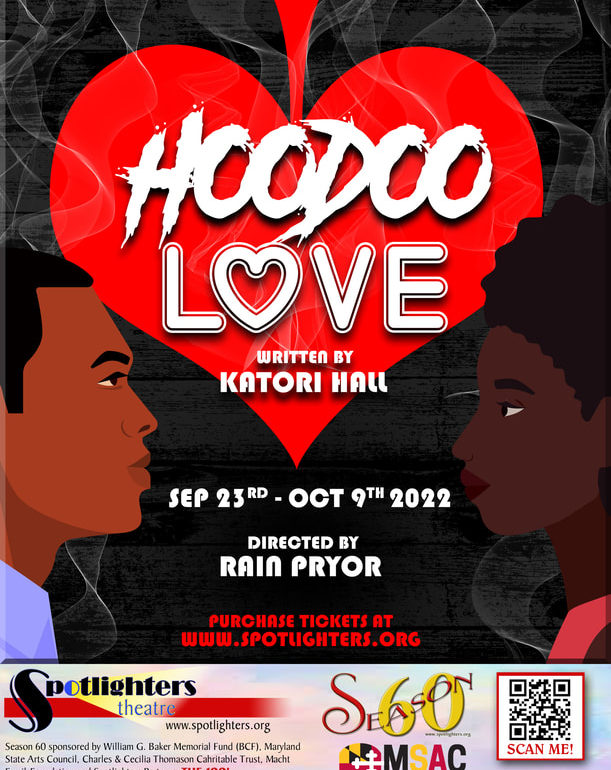Set in Memphis during the Great Depression, Hoodoo Love – written by Katori Hall, directed by Rain Pryor, and currently playing at the Spotlighters Theatre – exists at the seamy and sultry crossroads where superstition, the blues, and matters of the heart converge… the sort of crossroads where Tommy Johnson, referenced in this piece (along with a great many other blues legends), might well have stood at midnight and sold his soul for his music.

The story is centered on Toulou, a shack-dwelling woman who – like many Southern Black people of the time – essentially continues to do slave work on the nearby plantations in exchange for a pittance. Her neighbor is wise old Candylady who’s a practitioner of hoodoo, the tradition of “root work,” “tricks,” and “mojo” carried over from her ancestral Afro-Caribbean roots. A talented young musician (and notorious ladies’ man) called Ace Of Spades holds Toulou’s heart in his hands, but she can’t seem to pin him down. Meanwhile, Toulou’s charismatic ne’er-do-well brother Jib is her unwelcome guest, taking advantage of her whenever possible and reminding her of a family history she’d prefer to forget.
Hall’s writing is refreshingly sharp, presenting a crackling lexicon of authentic period dialogue. The turns of phrase combine the lyrical with the lewd in a hundred different and delicious ways – it’s a feast for the ears, the kind that rarely graces the stage anymore (or the screen much either, for that matter). The dialect can be dizzyingly dense, with arcane terms launched at the audience at breakneck speed; still, Hall manages to make herself understood perfectly, which is no small feat.

This accomplishment is particularly noteworthy in Hall’s deft handling of hoodoo lore and language. It bears mentioning that this reviewer happens to have more than a passing familiarity with such topics, and so it was a genuine treat to see them dealt with in a manner both knowledgeable and compelling. Hoodoo is a practice both convoluted and curiously homespun. It’s a system of belief among an oppressed and impoverished diaspora, in which fear, superstition, and oral history are key; and the traditional tools and elements of its place of origin must be swapped out for whatever meager replacement is at hand and feels right. The Byzantine down-home remedies recited here feel as though they could have been lifted directly from Zora Neale Hurston’s seminal Hoodoo in America.
Toulou and Ace Of Spades are the sun and moon of the play’s central drama – however, in their respective roles, Sharon Carter Brown and Mark Wallace frequently fall short of generating the necessary gravitational magnetism. Both offer up occasional glimpses that they are capable of delivering grounded, in-the-moment, character-driven performances. Too often, though, their approaches to the scenes come across as loud, unfocused, disconnected flailing and proclaiming to the rafters instead (something not required in such an intimate space).
Also, regrettably, the lack of overall precision in their performances too often crosses the all-important line between patois and pantomime, robbing these wonderfully-conceived words of their power and poetry. Their delivery turns it into an incomprehensible slurry, and in doing so, it seems we lose at least a third of the lines. In those rare moments when these actors punch their phrases to proper effect – and invest themselves in them fully – there’s genuine magic there, and it provokes real emotional responses from the audience. If the two of them could find that sound together and harmonize it for the full two hours, the results would be a revelation.
They are not helped by Pryor’s somewhat aimless and haphazard blocking. These actors pace and wander – not conveying the tension of tigers prowling a cage, but of fidgety performers who have not been given adequate guidance in terms of where to ground themselves and how to direct their energy. It’s worthy of note, however, that conceiving effective blocking strategies in a “theatre-in-the-round” (or rather, “theatre-in-the-square”) space like the Spotlighters Theatre cannot be easy. The space is cleverly appointed, but no matter which way the actors present themselves, at least half of the assembly are inspecting their backsides.
Wherever Brown and Wallace dropped their focus and precision, though, Nikolas Hubbard (“Jib”) appears to have picked it up, brushed it off, and rakishly tucked it into his lapel. His gregarious charm is intertwined with a serpentine intensity, making him the preacher and the snake in Eden all in one. His strident (and, at times, menacing) cadence is electrifying, and even when he plays drunk and staggers all over the stage, it conveys the awareness of a serious actor using his body and voice as instruments to their fullest extent. He brings to mind the performances of Laurence Fishburne in What’s Love Got To Do With It or Danny Glover in The Color Purple.

The show’s anchor is Andromeda Bacchus, who portrays Candylady. She is by turns funny and fierce, and her folksy gravitas holds the whole piece firmly in place. She’s patient and precise with the dialogue, and so she does great justice to the hoodoo patois and the weight of the history behind it, sounding as earnest and well-versed on the subject as the most seasoned practitioners. Her accent and stern recitations of hoodoo remedies would be difficult for many local performers to convincingly pull off without sounding muddy at best, or laughable at worst – but she embodies the role and masters the dialect, and when we laugh, it’s with her, never at her. To belabor the earlier metaphor: If Toulou and Ace Of Spades are the sun and moon, then Candylady is the earth, the ground where the seeds of hoodoo are sown and reaped.
Music Director Deletta Gillespie’s choices in constructing this show’s soundtrack are magnificent. We are treated to the primal scream of the blues in its infancy – the raw wails, hoots, and hollers that are capable of provoking chills to this day. There is a special delight that comes from being exposed to such obscure gems by individuals like Gillespie or T-Bone Burnett, who point us in a direction of incredible discovery when it comes to musical history in general and American folk in particular.
The show’s program and promotional material make no secret of the fact that Hoodoo Love depicts sexual assault. It should be noted that in this post-Game of Thrones era, it is easy for us to think of ourselves as jaded when it comes to viewing such things in our media. However, it’s another thing entirely to be in the room with live actors as it plays out. It’s immensely uncomfortable, as it should be, and the show is to be commended for not flinching from it. After all, Hall has dedicated it “most importantly, to female survivors all over the world.”
Running Time: 2 hours with one intermission
Hoodoo Love plays through October 9, 2022 at The Audrey Herman Spotlighters Theatre— 817 St. Paul Street in the historic Mount Vernon neighborhood of Baltimore City in Maryland. For tickets call the box office at (410) 752-1225 or purchase them online.

